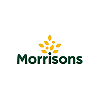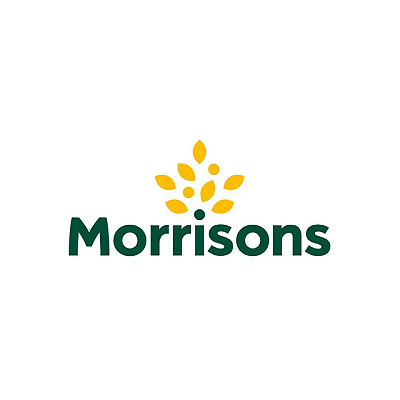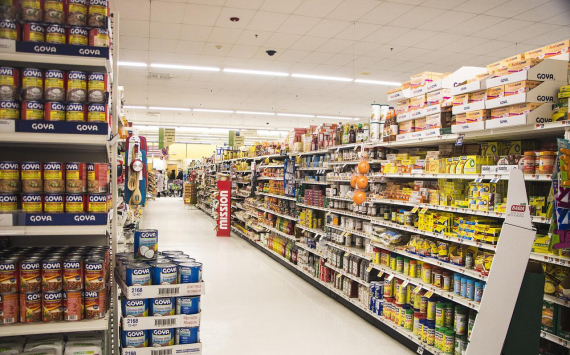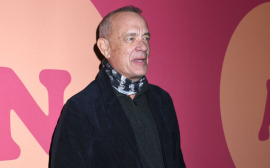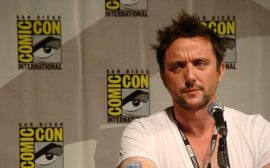Description
Wm Morrison Supermarkets plc, trading as Morrisons, is the fourth largest chain of supermarkets in the United Kingdom, and is headquartered in Bradford, West Yorkshire, England.
Founded in 1899 by William Morrison, hence the abbreviation Wm Morrison, it began as an egg and butter stall in Rawson Market, Bradford, England. Until 2004, Morrisons store locations were primarily focused in the North of England, but with the takeover of Safeway in that year, the company's presence increased significantly in the South of England, Wales and Scotland. As of 2016 the company had 494 supermarkets across England, Wales and Scotland, as well as one in Gibraltar.
As of February 2021, Morrisons employed 110,000 employees, and served around 11 million customers each week.
Morrisons' market share in August 2017 was 10.14%, down 0.86% from 2015—behind Tesco (27.8%), Sainsbury's (15.8%) and Asda (15.3%) but ahead of Aldi (7%).
The company is listed on the London Stock Exchange and is part of the FTSE 250 Index of companies.
History
Founding
The company was founded by William Morrison in 1899, who started the business as an egg and butter merchant in Rawson Market, Bradford, England, operating under the name of Wm Morrison Limited.
His son Ken Morrison took over the company in 1952, aged 21. In 1958, Morrisons opened a small shop in the city centre. It was the first self-service store in Bradford, the first store to have prices on its products, and it had three checkouts. The company opened its first supermarket, "Victoria", in the Girlington district of Bradford in 1961.
In 1967, Morrisons became a public limited company listed on the London Stock Exchange.
Acquisition of Safeway
Morrisons expansion into Scotland following acquisition of Safeway lead to the first Scottish store opening in Kilmarnock in 2004
In March 2004 Morrisons acquired Safeway, a British supermarket chain which owned 479 stores, allowing Morrisons to have a larger presence in southern England. The company was purchased for £3.3 billion, comprising 1 new Morrisons share (enabling Safeway shareholders to have a 40% stake in the enlarged group and reducing the Morrison family's shareholding to 18%), plus 60 pence in cash (paid for by the divestment of 52 overlapping stores) for each Safeway share held. The acquisition quickly ran into difficulties caused in part by Safeway UK's outgoing management changing that chain's accounting systems six weeks before the transaction was completed. The result was a series of profit warnings being issued by Morrisons, poor financial results and a reversion to manual systems.
The programme of store conversions from Safeway to Morrisons was the largest of its kind in British retail history, focusing initially on the retained stores which were freehold, over 25,000 sq ft (2,300 m2) with separate car parks. Within a few weeks, Safeway carrier bags were replaced by those of Morrisons and Morrisons own-brand products began to appear in Safeway stores.
Originally 52 shops were to be compulsorily divested after the takeover. Two closed for other reasons, John Lewis Partnership purchased 19 to be part of its Waitrose chain, while J Sainsbury plc purchased a further 14, and Tesco bought 10 in October 2004. At the time Morrisons chose not to move into the convenience store sector (although it has since done so with its M Local stores). Further to this policy decision, it was announced in late 2004 that the 114 smaller 'Safeway Compact' stores would be sold off to rival supermarket chain Somerfield in a two-part deal worth £260.2 million in total.
In Northern Ireland Morrisons sold the Safeway stores, and a store in Bangor that opened after the Morrisons takeover, to Asda.
One of the largest single purchases in 2005 was that of five stores by Waitrose. On 18 July 2006, a further six stores were sold to Waitrose, including the former Safeway store in Hexham, Northumberland, which became England's most northerly Waitrose branch.
In May 2005, Morrisons announced the closure of Safeway's joint venture convenience store/petrol station format with BP. Under the deal, the premises had been split 50/50 between the two companies.
Morrisons also sold Safeway's Channel Islands stores, in Guernsey and Jersey, to CI Traders where the stores continued to trade as Safeway, although the products they sold carried the brand names of chains such as Iceland. In 2011, Sandpiper CI/CI Traders sold the Channel Island Safeway stores to Waitrose and the Safeway brand disappeared from the Channel Islands. On the Isle of Man, the Douglas store was sold to Shoprite and the Ramsey store was sold to The Co-operative Food. The Gibraltar store was originally marketed for sale, but was ultimately converted. In November 2006, plans were submitted for the extension and redevelopment of the store to introduce the full Morrisons format.
Former store in Consett, County Durham, using former branding. Since replaced with a new build store in November 2012
In September 2005 the company announced the closure of former Safeway depots in Kent, Bristol and Warrington with the loss of 2,500 jobs. The Kent depot has since been sold to upmarket rival Waitrose, whilst Warrington was sold to frozen food rival Iceland. Part of the Bristol depot has been sold off to Gist. The store conversion process was completed on 24 November 2005 when the final Safeway fascia disappeared from the UK.
Optimisation plan
Following the acquisition of Safeway, Morrisons encountered a number of difficulties. The company had issued five profits warnings since the acquisition, and it was felt that the original Morrisons northern format did not work as well in some of the former Safeway stores in the south. To reinvigorate its new national image, Morrisons appointed the Dutchman Marc Bolland (the chief operating officer of Heineken), as its new Chief Executive.
Retirement of Sir Ken Morrison
On 13 March 2008 Sir Ken Morrison retired as chairman after 55 years at the company and was made Honorary President.
Purchase of Co-op and Somerfield stores
When the Co-operative Group completed its takeover of the Somerfield supermarket chain in March 2009, it was required to sell a number of stores by the Competition Commission. Morrisons purchased 35 stores from the combined group, mostly trading under the Somerfield fascia. These new stores were the first of more than 100 identified by Morrisons for expansion into smaller supermarkets as it aims to have a store within 15 minutes of every UK home.
Multi-channel diversification
Following Marc Bolland's departure to become the CEO of Marks & Spencer in December 2009, Dalton Philips was appointed in a surprise move as his replacement in January 2010.
In 2010, Morrisons signed a deal with budget retailer Peacocks, the first concession store opened as part of a refurbishment at the retailer's store in Idle, Bradford. The Peacocks section was rolled out into other stores before launching its own childrens-wear brand 'Nutmeg' into 85 stores on 21 March 2013.
The first Morrisons M local store opened in Ilkley, Yorkshire, in 2011. All M Local stores were later rebranded under the short-lived "My Local" chain in 2015.
In May 2013, Morrisons announced a partnership with Ocado to use its technology systems and distribution infrastructure to help launch its own online service.
Richard Pennycook, who had joined Morrisons in October 2005, was replaced as Chief Financial Officer at Morrisons in June 2013 by Trevor Strain, previously Finance Director Corporate.
Failed takeover bids
In February 2014, it emerged that younger members of the founding Morrison family, who own 10% of the company and who are thought to include two of Honorary President Sir Ken Morrison's children, William Morrison Junior and Andrea Shelley, along with Sir Ken Morrison's niece and her husband, Susan and Nigel Pritchard, had approached a number of private equity firms about taking the company private. They were said to be extremely unhappy about the company's disastrous financial performance, and the corporate strategy being undertaken by Dalton Philips.
Following a new three-year corporate strategy revealed in March 2014 aimed at recovering sales and market share, at Morrisons Annual General Meeting in June 2014, Morrisons former chairman Sir Ken Morrison blasted Dalton Philips and his new board of directors for destroying the company he inherited from his father; Morrison remarked on Philips's strategy to save the failing supermarket from the pressures of Aldi and other discounter stores, stating "When I left work and started working as a hobby, I chose to raise cattle. I have something like 1,000 bullocks and, having listened to your presentation, Dalton, you've got a lot more bull **** than me."
Morrison's comments were backed up by his nephew Chris Blundell, who controls most of the remaining family stake in the supermarket, who also told the board it needed rescuing, and welcomed the decision by chairman Sir Ian Gibson to leave the business next year (in June 2015) after months of pressure.
2021 Takeover
In June 2021, Morrisons rejected a £5.5 billion takeover bid from private equity firm Clayton, Dubilier & Rice believing it would have “significantly undervalued” the company.
In July 2021, the company was subject to a separate takeover bid, valuing the company at £6.3bn ($8.7bn), with the proposed takeover being led by US private equity firm, Fortress Investment Group and backed by the Canada Pension Plan and Koch Industries. This bid was provisionally accepted by the board, subject to shareholder approval on 3 July 2021. Following the announcement of the agreement with Fortress it was announced that Apollo Global were also considering making a further offer, which led to speculation that a bidding war may commence. However, on 20 July 2021, Apollo Global confirmed that they would not seek to make a bid but would instead support the bid that had been made by Fortress Investment Group. On 6 August 2021, the private equity consortium led by Fortress increased its offer to £6.7 billion ($9.29 billion) after Silchester International Investors, Morrisons largest shareholder, said the previous offer was too low. The Morrisons board once again recommended the deal to shareholders.
Restructuring
In June 2014, Morrisons announced that plans had been put in place to cut 2,600 jobs as a result of changes to its management structure. Morrisons stated that it had trialled the new structure and believed that better performance was achieved via these methods. These cuts would primarily affect department manager and supervisory positions. Morrisons would create 1,000 jobs in Morrisons M local convenience stores and 3,000 in new supermarkets. Following this, Morrisons sold its distribution centre in Kent to a real estate investment company for £97.8 million. The depot in Kemsley was to be immediately leased back to the supermarket chain on a 25-year agreement, for a rent of £5.4 million per annum.
Following a 3.1% drop in like-for-like sales in the Christmas 2014 trading period, Morrisons announced the widely expected resignation of the heavily publicly criticised Chief Executive of five years, Dalton Philips, to become effective in March 2015. In addition the chairman, Sir Ian Gibson, would stand down six months early to be replaced by former Tesco chief financial officer Andrew Higginson at the end of January 2015. Five additional executives left the company in March 2015.
Morrisons also announced the closure of 10 small loss-making stores (eight former Netto UK stores and two former Somerfield stores, bought under Philips's leadership) in Cramlington, Accrington, Ravensthorpe, Bransholme (Hull), Telford, West Bromwich, Wallasey (Seacombe), Newton le Willows, Rugby and Crawley. In addition, six unprofitable convenience stores would close, and the roll-out of the convenience store chain would be slowed, as a batch of 40 sites would no longer be bought.
On 25 February 2015, Morrisons named former Tesco director David Potts as its new chief executive.
In June 2015, Morrisons cut the price of 200 'everyday items' by up to 33% The store chain's like-for-like sales had fallen by 2.9% in the first three months of 2015—after falling 2.6% in the last three months of 2014. The company responded by deciding to 'simplify' its head office in Bradford—at the cost of 720 jobs.
In September 2015, Morrisons announced the sale of its 140 M Local stores to Mike Greene and Greybull Capital, to be re-branded My Local, for £25 million and that it planned to close 11 supermarkets, costing a reported 900 jobs. Following on from this in January 2016 Morrisons bosses announced that a further 7 stores would be closing to help optimise their existing assets and address areas of underperformance.
From March 2020, Morrisons will cut down 3,000 management roles and create 7,000 shop floor jobs as part of its restructuring plan.
Current operations
In July 2020 Morrisons had 497 superstores in the United Kingdom, including those it retained following its purchase of Safeway plc. Until 2004, Morrisons superstores were largely concentrated in the English Midlands and the North of England, but had expanded southwards, beginning with a store at Erith, Greater London, which opened in 1998.
In April 2021, Morrisons said that it will stop selling plastic bags and will remove them from its stores and will replace them with paper bags as a move to cut the plastic use.
Store formats
Most Morrisons superstores have produce in Market Street. Packaged meat is near or next to the butcher's counter, the delicatessen with cheese fridge nearby, and a rotisserie counter named Oven Fresh.
Convenience stores
Following the failure of the supermarket's M Local stores, Morrisons returned to the convenience market in 2016 with a new chain of five trial forecourt stores under the Morrisons Daily brand in partnership with Motor Fuel Group. Soon after in 2017, this trial ended with the stores closed and a new partnership was formed with Rontec to open 40 stores across the company's forecourts. In 2019, Morrisons Daily stores operated by MPK Garages and Essar began to trade under a similar deal.
In 2018, Morrisons agreed on a franchise and wholesale supply deal with SandpiperCI to operate 43 Morrisons Daily convenience stores in the Channel Islands, which were previously operated under the Nisa brand.
A partnership agreement in 2021 saw Morrisons and McColl's committing to the conversion of 300 existing McColl's convenience stores into Morrisons Daily stores over the next 3 years, following a successful trial of 30 conversions in the months prior. This extension is of a deal, first struck in 2017, which sees Morrisons acting McColl's sole supplier until at least 2027, with the supermarket currently supplying over 1,200 of their stores.
Morrisons revived the Safeway brand in 2016 for use in stores of its wholesale customers and in Morrisons Daily stores,[79] along with two MPK Garages forecourt stores which operate with Safeway Daily branding.
Online retail
In 2012, the group launched its first retail website called "Morrisons Cellar" selling wine from around the world.
Unlike its major competitors, Morrisons did not make an early entry into offering online shopping. In May 2013 Morrisons announced a partnership with Ocado to use its technology systems and distribution infrastructure to help launch its own online service. Morrisons also signed a deal with Amazon to supply products for their Prime Pantry.
Market share
Morrisons market share decreased after its purchase of Safeway, but it eventually grew again after the store disposals and conversions.
In mid-2015, Morrisons was still the smallest of the 'big four' supermarkets—with a market share of 11%, down 0.3% from 2014.
According to CACI, as of 2006, Morrisons had market dominance in 10 postcode areas; SY (Shrewsbury), LD (Llandrindod Wells), WS (Walsall), TS (Teesside), TD (Hawick), BD (Bradford), HG (Harrogate), LS (Leeds), WF (Wakefield) and HD (Huddersfield).
Vertical integration
Unlike the other UK supermarkets, Morrisons manufacture a substantial volume of their own food products at 16 sites in the UK.
Home-delivery service
In June 2020 Morrisons introduced a revamped doorstep subscription program targeting elderly and vulnerable people who cannot go shopping in supermarkets. The service is open to anyone residing within 10 miles of a Morrisons shop.
Former operations
Kiddicare
In 2011, Morrisons bought children's retailer Kiddicare for £70m to give it the knowledge to sell clothing and homewares online. In 2012 10 former Best Buy stores from the Carphone Warehouse were acquired to expand Kiddicare into retail stores. Kiddicare was sold to the Endless private equity firm for £2 million in July 2014, and sold on to Worldstores two months later for an undisclosed sum.
FreshDirect
Morrisons purchased a 10% stake in New York-based online grocer FreshDirect for £31 million in 2011. After having sent a team to New York to learn from the business ahead of the predicted launch in 2013, Morrisons began a home delivery initiative in January 2014. In March 2014 Morrisons CEO Dalton Phillips announced the company had agreed to sell its stake in FreshDirect due to financial difficulties the company was facing and, as it had set up its own online shopping site, it no longer needed FreshDirect. The sale was completed in August 2016 for £45 million.
Convenience stores
The company operated a number of smaller stores called "Morrisons M Local" in major places such as Birmingham, Manchester, Cardiff and Bristol. These stores had a similar format to small Tesco Express and Sainsbury's Local stores, but included a wider range of ready-to-eat hot food such as pastries, coffee, rotisserie, porridge and also a salad bar. Items were supplied from nearby superstores and shoppers could also order foods, including fresh meat and fish.
A distribution centre in Feltham, West London was acquired to provide a distribution network to the stores in London and the South East where there are relatively few Morrisons superstores.
Around 70 stores were opened by the end of 2013, boosted by the purchase of 7 Jessops and 49 Blockbuster stores from administrators. On 26 February 2013, a further six HMV stores were acquired from administrators. The M Local chain was sold to a private equity group in 2015 and rebranded My Local, but entered administration itself less than a year later.
Marketing and branding
Logos and slogans
On 15 March 2007, Morrisons unveiled a new "more modern brand image", which was rolled out to all stores, vehicles and distribution sites. This kept the main 'Morrisons' signage and colour scheme, while replacing the familiar 'M' logo. The low price in-house brand, Bettabuy, was also changed to a 'more modern' brand called Morrisons Value, which was again rebranded to M Savers in January 2012. The change saw the replacement of the old yellow and black logo, with the 'More Reasons To Shop at Morrisons' strap line replaced with 'Fresh Choice For You'. In 2010 this was replaced by 'Eat Fresh. Pay Less'. This was later changed again in 2013 to 'More Of What Matters'. It also involved the replacement of external signage, with the previous Morrisons signs being retained alongside the new logo, as well as changes to product packaging, point of sale, advertising, staff uniforms (replacing the old blue ties and bows with green ones) and distribution vehicles. The rationale behind the decision was the need for Morrisons to attract a wider national customer base, capitalising on its expanded geographical spread following the acquisition of Safeway.
In 2016, Morrisons released a new logo and slogan 'Morrisons Makes It' to try and draw on the brand's heritage, with the new logo being installed on all store signs as well as new uniforms and new in-store looks. As well as this, the capital M, as seen on the top of the other logos, is removed and instead replaced at the bottom, 'Since 1899' and above the I, are yellow flower petals. As well as this, all of the letters, apart from the M, are all turned into lowercase letters.
Loyalty card
The Match & More card price matched the chain's customers' comparable grocery shopping in store and online with Aldi, Lidl, Tesco, Sainsbury's and Asda. If a customer spent £15 or more and could have paid less for their comparable groceries, Morrisons automatically gave them the difference in points on their card at the checkout. For 1p difference in the cost of shopping, customers got 10 Match points—and for £1 difference they got 1,000 points. The difference was calculated at the checkout on national brands and comparable own label products and fresh food, even those that are on promotion elsewhere. In 2016 the Match & More loyalty cards were rebranded as the "More" loyalty card and all customers were issued a new card in line with the rebranding. The loyalty scheme was rebranded once again in May 2021 as "My Morrisons", in line with the company dropping the points collection feature.
Product ranges
Morrisons stocks thousands of lines sold under their own brands. These include M Savers, an economy brand including items ranging from food and drink to toiletries, in 2015 the UK's fastest-growing grocery brand.
Tommy's Afternoon Tea Box
Morrisons has launched a special 'Tommy's Afternoon Tea Box' to support shoppers mark the end of World War Two anniversary on 2 September 2020. The boxes benefit the Tommy Tea initiative through the Royal British Legion Industries (RBLI), with £1 on every box heading to the charity, as well as an additional £10,000 provided by the company.
Distribution
In 2005, Morrisons purchased part of the collapsed Rathbones Bakeries, which supplied Morrisons bread, for £15.5 million.
In 2007, Morrisons opened a new Distribution Centre in Swindon and announced that it had bought a new site on Junction 23 of the M5 in Bridgwater in Somerset, for redevelopment as a fresh produce packing facility.
In 2011, Morrisons opened a new 767,500 sq/foot distribution centre in Bridgwater as part of the £11 million redevelopment project. This project also created 1,200 new jobs. Following the opening of the new distribution centre the Swindon depot was no longer required, and it was closed in December 2011.
Criticism
Chickens
On 16 August 2021, a worker led a protest against the company for raising deformed birds at four of its intensive farms. The Independent reported that campaigners from Open Cages, Animal Equality UK and The Humane League UK were "urging Morrisons to sign the Better Chicken Commitment (BCC) – a policy which bans the use of fast-growing breeds and aims to ensure birds are given natural light and more space". It was reported that the fast growing birds could suffer lameness and heart attacks, and were raised in cramped conditions. In response to the investigation, the company responded: "We care deeply about animal welfare and require all our suppliers to maintain the highest standards. We have asked [the supplier] to conduct a full investigation and report back to us."
Potentially harmful dog feeding
In December 2012 a television advertising campaign which showed a child giving a dog pieces of Christmas pudding was criticised by the British Veterinary Association and the Kennel Club. Christmas pudding contains raisins, which can be harmful to dogs, which led to concern that the behaviour in the clip could be copied with detrimental consequences for animals. A spokesman for Morrisons stated that it had sought veterinary advice before the shoot, at which a vet was present. Advice given was that "...there would be minimal, if any, risk to a dog of serious toxic reaction should a small amount, in relation to its body weight, of Christmas cake or pudding be consumed on a one-off basis."
Inaccurate claim of support for British farmers
Following a well-publicised crash in UK milk prices, Morrisons launched UK-flag-branded milk labelled 'For Farmers' promising an extra 23p per carton. In fact the extra money—equivalent to 10p a litre—went to Danish milk co-operative group Arla Foods, to be divided among several countries, with only one quarter of the 23p going to UK farmers.
Paula Vennells
Morrisons has been criticised for retaining Paula Vennells on its board, despite her role as CEO of the Post Office during the subpostmasters' scandal and criticism of her leadership there as "both cruel and incompetent" by a Conservative peer and various MPs.

